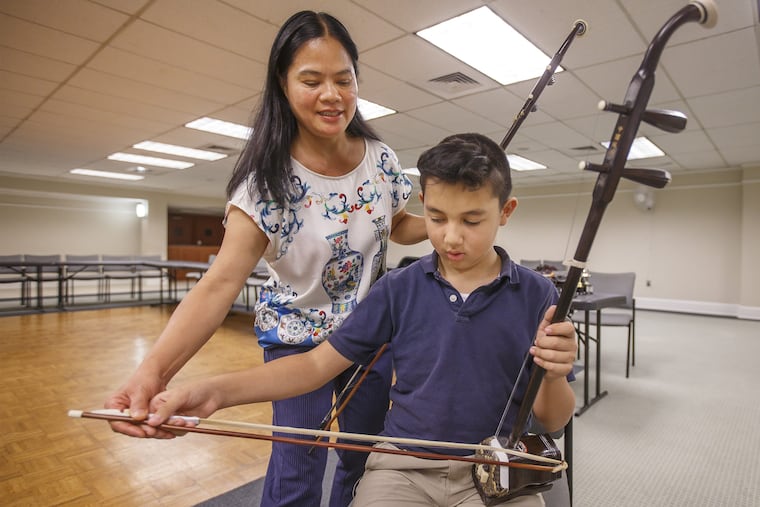This erhu specialist is working to make Chinese music more visible in Philly
The erhu, also known as the "Chinese violin," is a two-stringed instrument that has existed for more than a thousand years.

With a world-class orchestra and more than a handful of historic music venues, Philadelphia's music scene has both breadth and depth. But Qin Qian believes that the instrument that she's spent decades mastering — the erhu, a traditional two-stringed bowed instrument that has existed in China for more than a thousand years — still flies under the radar.
"Americans actually really like this type of music," Qin, who has been studying the erhu since she was 8-years-old, said in Mandarin. "Whenever I perform here, lots of people ask me what the instrument is. They're all very curious."
The erhu, which is typically made out of red sandalwood and python skin, differs from such Western stringed instruments as violins and cellos in that it has no fingerboard, so players must press directly on the strings. It's also played vertically while resting on the player's lap, and the bow is already fixed between the strings. One of the main challenges of playing the erhu is that the instrument's intonation can change drastically, depending on finger positions. Affectionately known as China's violin and studied by traditional Chinese music enthusiasts, the instrument is still extremely popular in China.
Unsurprisingly, not many Philadelphians have heard of this instrument, according to Qin. She is the only erhu player performing regularly in the area. In her time here, she has performed at the Kimmel Center, the Free Library and St. Joseph's University. When she's not performing, Qin also teaches at Swarthmore College and Ding Hao Chinese School on the Main Line.
"There aren't many musicians here playing Chinese traditional music," she said. "I hope that eventually there are more. It's very unique."
Qin moved to Philadelphia in 2005 from a province in China called Guangxi. She had visited the United States for the first time the year before, when she spent six months traveling around the country, performing and teaching classes. Qin said immigrating to the United States has given her more chances to collaborate, and she's branched out from traditional Chinese music to other styles, including Italian and Irish — all on the erhu. She praised the artistry level of the other music groups here, saying that it's on a different level from music groups in China. (During the Cultural Revolution, Mao Zedong censored all forms of art, including music, leading to a loss of talent.)
"I've been in Philadelphia ever since immigrating," she said. "I have a special affection for the Philadelphia Symphony Orchestra. Also, there's a jazz scene here and I'm currently learning how to play jazz on the erhu. It's actually really suited to that style of music because it sounds so much like a human voice."
In China, Qin was admitted to study erhu at the Guangxi Arts Institute at 16 after spending time performing with the Guigang Troupe of Guangxi. After she graduated, she began playing around the country with other musical groups, such as the Guangxi Symphony Orchestra, eventually becoming a teacher and composer in her own right.
"My parents always said that I loved music as a child," Qin said. "They never had to tell me to go practice — I'd just do it myself."
That kind of determination is something Qin tries to impart to her students today. Her most experienced student, 13-year-old Kelvin Wang, has been playing for seven years. Under her guidance, he has won a handful of contests for his erhu playing. Wang first picked up the instrument when he attended one of his grandfather's lessons.
"I like the music and how it sounds, more than violin," said Wang, who spent most of his lesson on a recent Wednesday afternoon workshopping a piece for an upcoming competition. "Playing the violin isn't as flexible and I like the challenge of figuring out exactly where to put my fingers to find the right notes."
During his lesson, Wang also helped acclimate one of Qin's newest students, 11-year-old Jordan Paynter. He became interested in the instrument after trying it out at Qin's house when his mother was running errands. Wang helped tune Paynter's instrument and played through some of the most basic notes, while Qin looked on approvingly.
"I was surprised that Jordan really liked the instrument," Shuang Chen, Jordan's mom, said in Mandarin. "He's only had four lessons but he's been showing our neighbors what he's learned. He's never listened to traditional Chinese music before or seen the instrument in his life."
Even though most Philadelphians have yet to encounter the erhu, Qin is confident that the instrument will eventually become one that transcends the ideas of "Western" and "Eastern" music.
"Maybe it'll take 50 years, maybe it'll take 100 years," she said. "Right now it's just a Chinese instrument, but with time, more people will know about it. It'll become a global instrument."